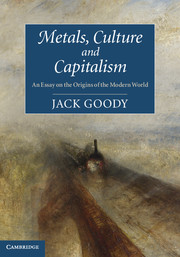Book contents
- Frontmatter
- Contents
- Maps
- Plates
- Preface
- Acknowledgements
- Chronology
- Part I Explorers
- Part II Merchants
- Part III Accumulators
- 11 Iron and the Industrial Revolution
- 12 Metals, ‘capitalism’ and the renaissances
- Appendix 1 The metallurgy of iron
- Appendix 2 Damascene steel and blades
- Glossary (with the aid of J. A. Charles)
- Bibliography
- Index
- Plate section
11 - Iron and the Industrial Revolution
Published online by Cambridge University Press: 05 June 2014
- Frontmatter
- Contents
- Maps
- Plates
- Preface
- Acknowledgements
- Chronology
- Part I Explorers
- Part II Merchants
- Part III Accumulators
- 11 Iron and the Industrial Revolution
- 12 Metals, ‘capitalism’ and the renaissances
- Appendix 1 The metallurgy of iron
- Appendix 2 Damascene steel and blades
- Glossary (with the aid of J. A. Charles)
- Bibliography
- Index
- Plate section
Summary
Metals were obviously crucial to the Bronze Age civilisations of the Near East, and to Eurasia generally. But these were mainly civilisations of the river valleys, where surplus food could be readily produced with the aid of the plough and where the rivers made for the easy transport of heavy goods, stone, timber and ores from other parts. To bring these, they needed ships. There was of course trade and exchange of many goods; however metals, not only precious ones but also the base variety, were essential to the development of city – and indeed of rural – life, then and ever since. But, except in China (regarding it as a unity), they had no metals themselves, and had to seek them in the other regions; for the Near East one highly important supply lay later in the Mediterranean, and then in Europe more generally.
The consequent search for metals (and wood to heat them, as well as to build) was in itself a ‘civilising’ process, mainly affecting populations living on the boundaries of the city cultures, especially in the Levant, where Egypt and other countries traded with ‘barbarians’ for copper, as well as for the cedars of Lebanon. The critical players in the west were the coastal inhabitants of Tyre, Sidon, Byblos, Ugarit and elsewhere along that narrow stretch of the eastern Mediterranean, peoples who lived by the sea with little agricultural land but who developed a profound expertise in sea-faring, including trade, especially in metals. It was these men who were subsequently employed by the Egyptians to circumnavigate Africa, who established a colony in Carthage and exploited the highly productive mines in Spain, already worked by the Mycenaeans, and who built the town of New Carthage, or Carthagena, in the Iberian peninsular. In their voyages, the Phoenicians were even preceded by traders travelling around the Aegean and its various islands, from Crete and elsewhere with their many contacts both in the Near East and Greece. The Phoenicians themselves were joined in both exploration and trade by the inhabitants of neighbouring Israel (whose culture was very similar), and by the Greeks and Etruscans (and later by the Romans) whose lands bordered the inland sea and whose livelihoods were also tied up with trade (and war) along the coast.
- Type
- Chapter
- Information
- Metals, Culture and CapitalismAn Essay on the Origins of the Modern World, pp. 249 - 284Publisher: Cambridge University PressPrint publication year: 2012



